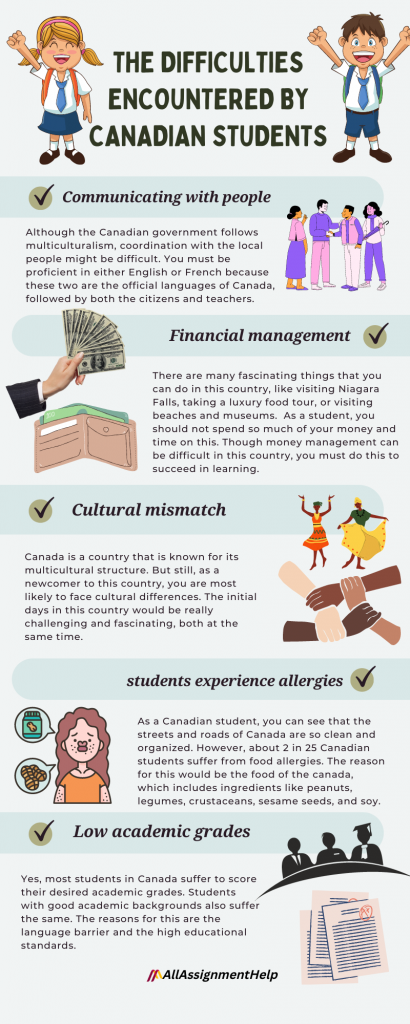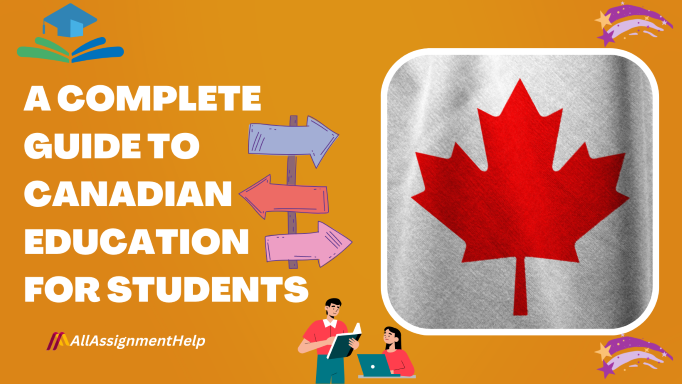Table of Contents
Canada is a student’s educational hub and home to some of the world’s best universities. Do you know that this country provides the highest level of education to its students and is one of the most educated countries? According to a recent report from the Organization for Economic Cooperation and Development (OECD), 56.27% of Canadian citizens are educated. The credit for the increased number of educated people goes to the Canadian government, which funds 11.4% of its GDP towards education. Are you interested in continuing your studies in Canada? But before enrolling yourself, you must know the education system and structure of Canada. If you lack the necessary knowledge, then do not worry. I am here to help you. In this blog post by allassignmenthelp.com, we have included all the information that will help the students adjust themselves and have a successful learning experience.
Also Read: Optimize Your Finances to Study in Canada: Enrolling in an Expensive Canadian University
The Education Structure of the Canadian Government
Canada is undoubtedly one of the best countries to study in. This country is preferable for everyone, whether you wish to pursue graduate or master’s studies. Canada’s education system has exceeded some of the top countries like the United States of America. Do you want to study at a Canadian institution but aren’t sure how to start? Allow me to assist you with this. This blog includes a list of the information architecture for all Canadian institutions. So make an effort to read everything.
1- Kindergarten
In Canada, as in other countries, kindergarten is the first step in education for students. Children who turn five can enroll themselves in one-year kindergarten programs. There are a few provinces in Canada that operate two-year kindergarten programs. The children of New Brunswick, the Northwest Territories, and Nova Scotia start their education at the age of five. Newfoundland, Alberta, Yukon, Ontario, Quebec, and British Columbia begin their education at age 6, while other countries start at age 7. In Ontario, there are two different kindergarten programs: primary and secondary. The Canadian government provides special offers to the children of low-income people.
2- Elementary education
This is also called primary education, and the Canadian government has made it mandatory for its citizens. This education starts after kindergarten. Beginning in grade 1 at the ages of 5, 6, and 7, children continue their primary education through grade 8 until they are 13, 14, or 15 years old. In Quebec, children get an education up to grade 6 only. The curriculum of primary education includes learning basic subjects like English, mathematics, science, and social science. Extra classes in music, dance, and art are also provided to help the children groom their talents. As of now, there are 10,100 primary schools for students, of which some are private, some are public, and a few religious schools are also available.
3- Secondary education
Junior high and senior high school are the two divisions of this educational system. The children studying in grades 9 and 10 are referred to as junior high schools, and the children in grades 11 and 12 are in senior high schools. Secondary education is a bit more advanced than primary education, and here the students get the chance to adjust themselves. This is the last stage of school life, and after that, the students enter into college life. The Canadian government takes all the necessary measures to prepare their students for the next part of life. The 12th grade is not regarded as a secondary school in Quebec, and following the 11th grade, students continue their studies at the university level.
4- Tertiary education
The term “university education” is also used to describe tertiary education. After completing their school studies with good grades, the students can enroll themselves in different colleges and universities in Canada. There are currently the best Canadian universities offering top-tier learning experiences to high-achieving students. If you are thinking of pursuing post-secondary education in Canada, then you will surely get the highest quality education at an affordable price. The University of Toronto is the highest-ranked university in Canada. If you are having difficulty understanding this university course, you can seek professional online assignment help Toronto.
So this was a short introduction to the structure of the Canadian education system. Canadian students are required to have a compulsory school education until the age of 18. Adapting to a new country to study in is not an easy thing. You will face different kinds of problems at both the initial and final stages. Below, we have listed a few of the challenges faced by the students of Canada.
Also Read: Subjects Where Students Mostly Seek Assignment Help in Canada
The Difficulties Encountered by Canadian Students
You need to have a basic understanding of the universities before applying. You can select the best university among the others by learning more about the academic institutions. The following is a list of the challenges faced by Canadian students.

1- Communicating with people
Whether it is Canada or any other foreign country, connecting with people is the most common problem faced by international students. Although the Canadian government follows multiculturalism, coordination with the local people might be difficult. You must be proficient in either English or French because these two are the official languages of Canada, followed by both the citizens and teachers. If you are not proficient in any of these languages, then studying in this country would not be easy for you. But do not worry, I have got a solution for you. You can seek assistance from an online assignment writing service in Canada. This service has specialists in all languages, and you can clearly learn from them at a reasonable price.
2- Financial management
Canada is the second largest country and one of the best tourist spots in the world. There are many fascinating things that you can do in this country, like visiting Niagara Falls, taking a luxury food tour, or visiting beaches and museums. You can also go shopping, as this country has some good clothing industries according to the students’ tastes. All of this would be a fantastic experience, but it could also be exhausting. As a student, you should not spend so much of your money and time on this. Though money management can be difficult in this country, you must do this to succeed in learning. You can enjoy your life in Canada, but try to do it with a minimal charge.
3- Cultural mismatch
Canada is a country that is known for its multicultural structure. But still, as a newcomer to this country, you are most likely to face cultural differences. The initial days in this country would be really challenging and fascinating, both at the same time. Making new friends will be more difficult if you are not from an English-speaking country. People use English as their main medium of communication. The different culture can make you homesick, which might badly affect your academic grades.
4- Canadian students experience allergies
As a Canadian student, you can see that the streets and roads of Canada are so clean and organized. However, about 2 in 25 Canadian students suffer from food allergies. The reason for this would be the food of the canada, which includes ingredients like peanuts, legumes, crustaceans, sesame seeds, and soy. So, if you are allergic to any of the food components, I recommend that you carefully read the menu and ingredients card before eating. You can get immediate medical assistance, but affecting your health will affect your grades also, so always be extra careful with this. When weed and pollen season is at its height in Canada, students who have asthma must likewise exercise caution and diligence.
5- Low academic grades
Yes, most students in Canada suffer to score their desired academic grades. Students with good academic backgrounds also suffer the same. The reasons for this are the language barrier and the high educational standards. But the teachers of the Canadian schools are well educated and are ready to help the students with their studies. If you ever face any difficulty with your subjects, you can get it cleared by your professors, but make sure to know the official language. Having a communication gap will not let you learn effectively. You can also hire assignment experts online if you still need extra academic help.
Also Read: Points to Consider While Selecting a University in Canada
Three Useful Advice for Canadian Students
Canada is a beautiful place to live and study. Canadian citizens are said to be the warmest and most welcoming people in the world. They treat international students with so much love and support. However, leaving your family, comfort, and country to pursue your education in a new country is not everyone’s cup of tea. But through dedication and patience, you will get through this. We have listed a few of the tips below that will help you to adjust yourself to a completely new nation.
- Follow the rules and regulations: Canada is one of the safest countries for students. International students can continue their studies without any difficulties here. However, you must follow the strictly imposed rules of the Canadian government to keep yourself out of any trouble.
- Prepare yourself for the Canadian climate: Canada is one of the coldest countries in the world and the temperatures can go down to minus 30. Take the necessary precautions to prevent colds if you do not want to suffer for your health and studies.
- Academic assistance: The academic standards of Canadian institutions are very high. If you are a normal student, then managing to score good grades can be difficult for you. But you can get Canadian assignment help easily and score good grades in academics.
So this was all just a few words of advice for the international students to help them succeed in their studies at Canadian universities. If you are ever low or not in the mood to study, take a break for a day or connect with your family and friends. In this way, you can remove your stress and focus more on learning.
Also Read: A Guide on How to Choose the Best Course at a Canadian University
Frequently Asked Questions
| Question 1: Does Canada follow a multicultural education system? Answer 1: Indeed, Canada is the only nation to have a multicultural society. After the Canadian Multiculturalism Act was passed in 1988, the government adopted multiculturalism. |
| Question 2: How much does it cost to study for a master’s degree in Canada? Answer 2: An average master’s degree in Canada will cost you around 1,000 to 35,000 CAD. However, popular degrees can cost you around 50,000 to 65,000 CAD. |
